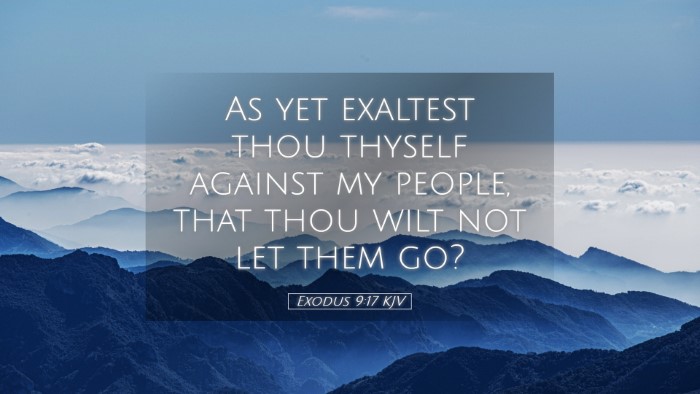Commentary on Exodus 9:17
Bible Verse: "As yet exalted thyself against my people, that thou wilt not let them go." (Exodus 9:17, KJV)
Introduction
Exodus 9:17 is part of the narrative surrounding the plagues of Egypt, specifically the seventh plague—hail. This verse encapsulates God's indictment against Pharaoh for his pride and refusal to submit to divine authority. The commentary presented below draws from the insights of noted theologians and biblical scholars including Matthew Henry, Albert Barnes, and Adam Clarke.
The Context of Pharaoh's Hardheartedness
Matthew Henry highlights that Pharaoh's persistent defiance demonstrates a heart entrenched in pride. Despite witnessing God's power through multiple plagues, he continues to elevate himself against God's will. Henry amplifies the notion that this refusal has led to the escalation of God's judgment upon Egypt.
Albert Barnes elaborates on the historical context, noting that the Egyptians worshipped various deities, and Pharaoh saw himself as a god. His arrogance is indicative of the broader Egyptian society's spiritual blindness. Barnes stresses the struggle between divine authority and human pride, underscoring the inevitable consequences of resisting God's commands.
God's Sovereignty and Judgment
Adam Clarke discusses the thematic elements of divine judgment throughout the plagues. In Exodus 9:17, God's words through Moses serve as a stark reminder of His sovereignty. Clarke notes that God's intention is not merely to punish but to reveal His greatness and severity against those exalting themselves above all that is divine.
Clarke also points out that God's patience is evident as He allows Pharaoh multiple opportunities to repent. However, each refusal to heed God's warning only solidifies Pharaoh's fate and positions him closer to devastating consequences. This paints a picture of the balance between divine mercy and justice, where repeated rejection leads to irreversible judgment.
Theological Implications
The refusal to let the Israelites go, as noted in the verse, serves as a microcosm of spiritual bondage. Matthew Henry emphasizes that this narrative can be seen as a reminder of humanity’s tendency to resist God’s liberation. The verse serves as a theological reflection on the nature of sin and pride, urging believers to examine their own hearts for areas of rebellion against God’s authority.
- Spiritual Pride: The verse warns against the perils of self-exaltation and pride, reflecting the necessity of humility before God.
- Resistance to God: It serves as a cautionary tale about the consequences of resisting divine will, highlighting the need for submission to God’s plans.
- God's Justice: The passage reiterates that God's justice is not arbitrary but comes as a result of human choices to reject divine authority.
Lessons for Pastoral Ministry
For pastors and church leaders, Exodus 9:17 presents profound insights into the nature of leadership and accountability before God. Ministry requires an understanding of humility and the recognition of one's limitations in contrast to God's sovereignty.
Albert Barnes reminds us that effective leadership in ministry involves guiding people toward acknowledging their rebellion against God and embracing His grace. Leaders must encourage congregants to examine their lives continuously to avoid the pitfalls of spiritual pride that ultimately lead to destruction.
Conclusion
Exodus 9:17 serves as a poignant reminder of the consequences of pride and the importance of heeding divine instruction. The reflections of various commentators succinctly affirm that while God extends grace, the ongoing rejection of that grace leads to severe judgments. Scholars, theologians, and spiritually-minded individuals are called to internalize these truths, recognizing that submission to God brings freedom and life, whereas resistance leads to bondage and death.


